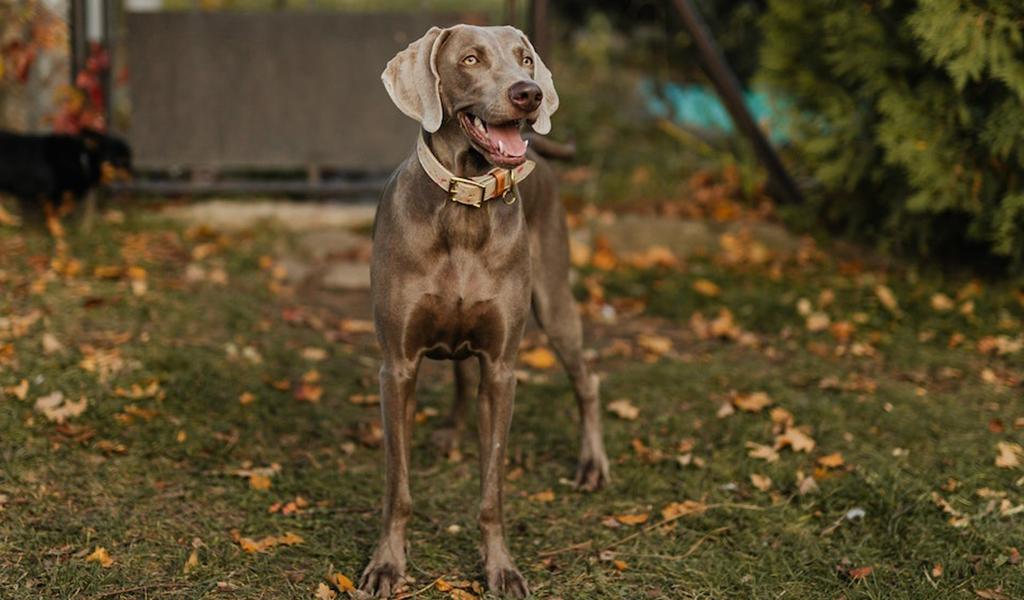What is a Weimaraner Dog Breed?
The Weimaraner is a large dog that was developed for hunting. Early Weimaraner were used by royalty to hunt large animals including boar, bear and deer. A well-bred Weimaraner will be solidly colored, perhaps with a small white patch on the chest.
The Weimaraner are wonderful pets because they are easy to maintain, trainable and have a loving attitude. They also get along well with children. The Weimaraner has a powerful build and a graceful, fast pace. They are often sociable and submissive, dogs need regular physical exercise.
Content Overview
- History
- Different names
- Appearance and Characteristics
- Personality and Temperament
- Health & problems
- How to take care
- Puppy Information
- Puppy price
- Things to consider adopting a puppy
- Advantages & Disadvantages
- Photo gallery
Weimaraner Dog History
The Weimaraner is a real puppy dog breed that was introduced in the early 1800s. The Weimaraner first arose around the beginning of the 19th century. These dogs belonged to the Weimar nobility, who created the “Weimar Pointer” breed to hunt large game. The Weimaraner is said to have ancestors or relatives in the Bloodhound.
The aristocracy restricted Weimaraner ownership to membership in the German Weimaraner Club, regardless of the breed’s place of origin. Later, when huge game dwindled in Germany, the Weimaraner was transformed into a bird dog.
The Weimaraner dog breed was created in the early 1800s and is a real puppy dog breed. Early in the 19th century, the Weimaraner breed first arose. The Bloodhound is said to be a progenitor or related of the Weimaraner. With the fall of huge game in Germany, the Weimaraner was later developed as a bird dog.
Different Names or Types
Weimaraner Dog other names
- Raner
- Weim
- Grey Ghost
- Weimer Pointer
Recognized Names
Recognitions
- AKC: American Kennel Club
- ACR: American Canine Registry
- DRA: Dog Registry of America
- FCI: Fédération Cynologique Internationale
- UKC: United Kennel Club
Appearance & Characteristics
The Weimaraner is sought after by people mostly because of its looks. These dogs have large, erect ears that hang down from the sides of their heads and are muscular.
They also have a distinctive gray coat that can range from mouse-grey to silver-grey, is smooth and short, and occasionally has white spots on the breast.
Their lips and ears are pink inside, and their noses are dark gray. Weimaraner puppies are also distinguished by their characteristic light blue eyes, which mature to an amber or gray-blue color.
Breed Basic Characteristics
- Country of origin: Germany
- Breed group: Sporting
- Life span: 11-14 Years
- Size: Medium To Large
- Height: 22-28 inch
- Weight: 55-88 Pound
- Coat: Short and Stiff
- Type: Purebred
- Shedding: Normal
- Colors: Blue, Gray
- Also as known: Grey Ghost
- Good with children: Yes
- Personality traits: Gentle, Friendly, Willful, Outgoing, Playful, Aloof
- Good with pets: Yes
- Barking: When Necessary
- Competitive registration: AKC, UKC, FCI, DRA, ACR
- Eyes: They have big almond shaped eyes
- Ears: Their ears are long, round, set high and floppy.
- Body: Medium body
Coat
The coats of Weimaraner are short, sleek, and silky. Different shades of gray with a silvery sheen in sunlight can be found in weimaraner dogs.
Color and Markings
Common coat colors for this Breed include.
- Blue
- Gray
- Silver Gray
Coat Color and Markings
The Weimaraner’s coat is short, silky, sleek, and uniform in color, ranging from mouse-grey to silver-grey. Some varieties may have faint white spots on the chest.
Personality and Temperament of Weimaraner Dog
The average Weimaraner dog has all the qualities that make him a great companion and watchdog: he is sociable, clever, fearless, attentive, obedient, and energetic. They are intelligent, outspoken, restless, and stubborn.
If you give this dog a chance, it will take over the house. Weimaraner won’t hesitate to crawl into bed with you for the night, whether they are fast to leap up and greet you or offer you a long embrace.
Weimaraner are always guarding their family and house, and they might be wary of passersby and bark excessively, similar to a home alarm system.
If you train it, don’t give it a social handler, it will bite, chase and investigate baked goods. Heredity, education, and socialization are just a few of the many influences on temperament.
Activity Requirements
Weimaraner should engage in at least one to two hours of energy-burning exercise each day, as they can become extremely destructive or exhibit behavioral problems. They may not get the exercise they need to burn off their stored energy. Weimaraner were bred to hunt large animals, so they love to run.
Their physically fit bodies need lots of activity, and their inquisitive minds need lots of stimulation. Although they may not be the best breed to keep in an apartment, if you decide to keep one of these excitable dogs in a small space, be prepared to give them regular exercise to help them focus their energies.
The Weimaraner dog needs three primary forms of exercise and movement every day: 1. Walks 2. Intentional energy-consuming action 3. Mental exercise.
Trainability
The Weimaraner are intelligent dogs. They pick up both positive and negative behaviors quickly. Positive reinforcement training is essential for Weimaraner, but it requires consistency. Due to the breed’s intelligence, it can also be reluctant and stubborn in the absence of clear pack leadership.
Weimaraner need training for their excitement during the puppy years because they are eager to learn. They respond best to positive reinforcement training that includes rewards, stroking, and praise in a planned curriculum that is based on the skills acquired each session.
Weimaraner training needs to be frequent, imaginative and consistent. This breed may have some difficulty learning to walk when called or on a free leash. Offer prizes they’ll love.
Health & Problems
The Weimaraner are generally in good health. Like all breeds they are prone to some health problems. To help the pup live as healthily as possible, it’s important to be aware of these health concerns.
The Orthopedic Foundation for Animals (OFA) has granted Weimaraner health clearances for von Willebrand disease, hypothyroidism, hip dysplasia, and elbow dysplasia.
Hip Dysplasia: This is a problem with the hip joint. Either side may be impacted. Clinical symptoms of hip dysplasia in dogs may or may not be present. The propensity for hip dysplasia, however, is thought to be inherited.
Von Willebrand disease: This genetic blood condition is brought on by a lack of coagulation factor VIII antigen. Excessive bleeding after an accident or surgery is the main symptom.
Hypothyroidism: Infertility, obesity, mental drowsiness, and loss of energy are among potential effects of hypothyroidism, which is brought on by a thyroid hormone shortage.
Feeding Plan
Regardless of breed, maintaining a healthy weight is important for dogs. For optimal health and performance, their diet should include physiologically appropriate proteins, healthy fats, ground bones and vegetables that are rich in important vitamins and minerals.
When making any nutritional changes you should pay particular attention to the dog’s weight and body condition. Make sure his diet has plenty of fiber and few sweets.
A dog needs plenty of water. High protein and fiber diets are some of the best dog foods for Weimaraner. The best choices are venison, lamb and seafood.
Living conditions
The Weimaraner are very curious dogs that were developed for hunting. They have limited tolerance for small animals and birds. Weimaraner can easily and proudly prey on small animals from other households if they are not socialized from a young age.
Early socialization also makes it easier for them to accept others as they can be very wary of strangers to the point of being hostile. They are enjoy being outdoors, but they also love human company.
Weimaraner are the perfect choice for those looking for a large, energetic dog for hunting, hiking and other outdoor sports. They are competent watchmen. Weimaraner need a lot of interpersonal contact. They get along well with other dogs.
Also Read: Basset Hound Dog Breed
How to Take Care of Weimaraner Dog?
The Weimaraner is a loving and devoted companion dog. They are harmful for various health problems. It is important to follow the veterinarian’s recommendations when receiving care.
Compared to other breeds, the smooth, short-coated Weimaraner requires little grooming. It is important to exercise them and provide them with proper training. Feeding them the best food is crucial to their health and quality of life.
Grooming & Brushing
Grooming helps prevent parasites and a number of skin problems. Having healthy teeth and gums keeps a dog’s mouth in good condition, which in turn keeps a dog’s heart in good condition. Trimming a Weimaraner dog’s nails is an essential part of grooming.
Grooming the dog also includes brushing him, brushing his teeth and taking care of his eyes. A dog’s external ear canal is long and curved. It is therefore important to clean a dog’s ears regularly to prevent problems such as ear infections, wax build-up and ear mites.
Regular brushing and combing of the Weimaraner can help you get rid of a lot of stray hair. With a Weimaraner, you can prevent bringing mud and filth home. most Weimaraner have short hair, they are easy to groom.
Feed Healthy food
As with all dogs, it is important to provide the Weimaraner dog with a healthy diet. Puppies need more protein, fat, calcium and phosphorus than adult dogs.
Chicken, lamb, turkey, beef, fish, yogurt and boiled eggs are all sources of protein, which is used to build and repair muscles and other body structures. Carbohydrates Dogs can get their energy from oats, brown rice, potatoes and whole wheat.
Fats from canola, olive or sunflower oil are responsible for providing high-quality energy. Vitamins A, B, C, D, E, and K maintain healthy skin and coat, build bones and teeth, and provide all-around vitality.
The following items should never be feed to Weimaraner Dog
- Yeast dough
- Tomato leaves stem or unripe fruit
- Salt & salty foods
- Poultry bones
- Onions, chives, and garlic
- Moldy or spoiled food of any kind
- Grapes or raisins
- Chocolate, coffee, or tea
- Alcohol, beer, wine or liquor
Puppy information
Weimaraner Dog Puppy Training
Proper training is important when bringing a Weimaraner puppy home. As a new pet owner you will be teaching the dog to use the whenever it is convenient for you.
Be prepared to spend the first two weeks observing the dog’s behavior and taking him out of the potty whenever you see him. Teaching the dog good manners, socialization, behavior training and education are crucial.
Behavioral training
The Weimaraner puppy needs to be socialized. If the puppy is properly rewarded and trained, these behaviors can be easily controlled. Here are 5 methods for teaching kids to be non-violent. To deal with it you need to be urgent, forceful, persistent and passionate. You should also give it a break.
Obedience training
The Weimaraner has a close bond with their owner. They are kind, intelligent and loving. The clever Weimaraner puppy breed enjoys training. They excel in stunts and agility.
In obedience training, you can teach him a variety of useful skills, such as coming when the phone rings, lying down or being asked to use the bathroom, as well as sitting, walking and running.
Socialization
The Weimaraner like other dogs, require early socialization, or being exposed to a wide variety of people, sights, noises, and experiences. they are puppy’s development into a well-rounded, gregarious, and sociable dog is aided through socialization.
His social skills will also improve if you regularly invite guests and take him on leisurely strolls to crowded parks, dog-friendly stores, and neighborhoods to meet people.
Weimaraner Dog puppies for sale
Things to consider adopting a Weimaraner Dog
- Weimaraner dog gets along well with children, they are calm, obedient and enjoy playing.
- This dog is a wonderful choice for hunting dogs since it has a keen sense and the endurance for lengthy runs, treks, and walks.
- Weimaraner have a strong sense of smell, so anything you leave behind or put in the garbage can will attract them.
- They require a lot of exercise and care, especially as puppies. They risk becoming bored and destructive if they don’t get enough physical and mental activity.
- They can trigger allergic reactions. Weimaraner dogs are not suitable for people who suffer from allergies.
Advantages and Disadvantages of Weimaraner Dog
Advantages
- They are very friendly, loyal and intelligent dogs.
- They don’t need much grooming.
- They can adapt to any situation.
Disadvantages
- Their barking level is high.
- Training can be quite difficult
- They could be aggressive to other animals.
Weimaraner Dog Photo Gallery







